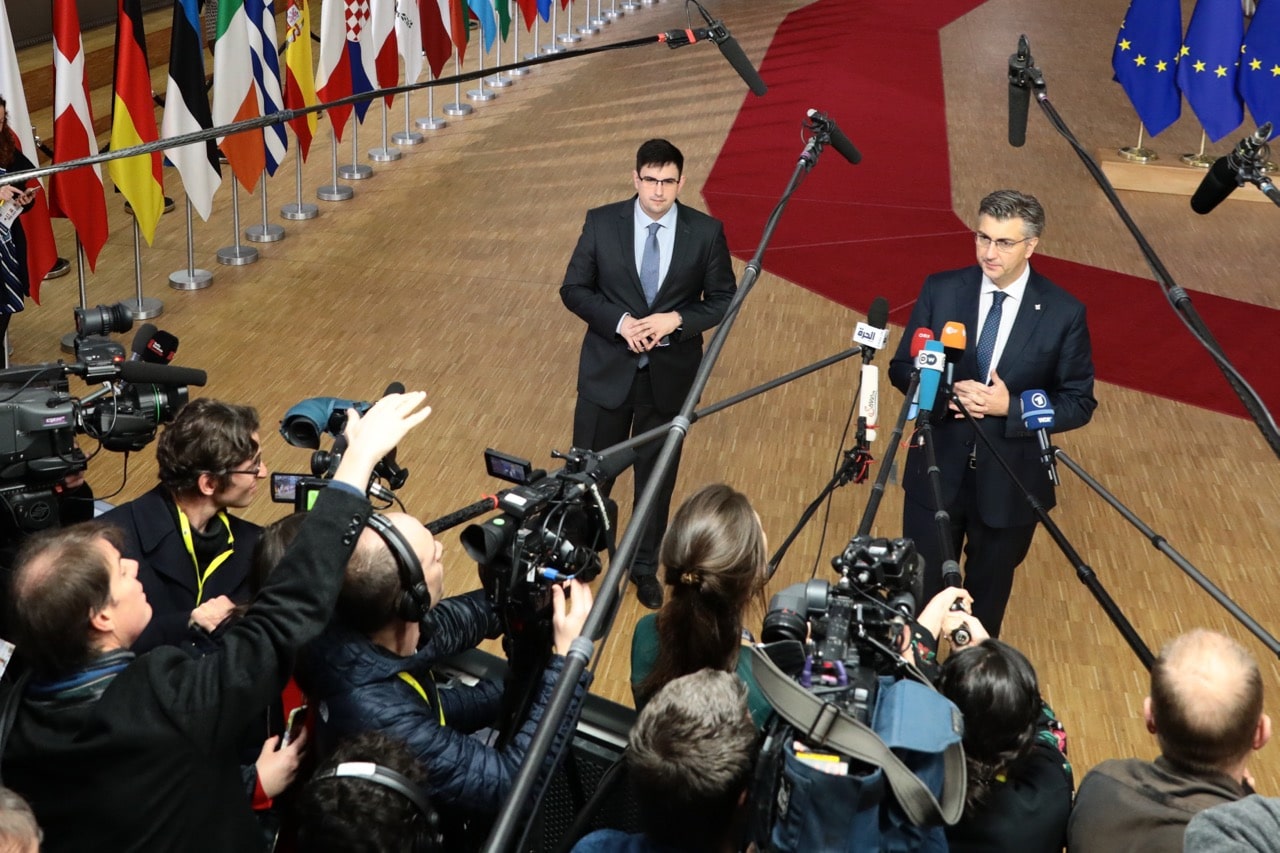(ARTICLE 19/IFEX) – The following is an ARTICLE 19 letter to the Croatian prime minister regarding defamation provisions in the Criminal Code: Mr. Ivica Racan Prime Minister Republic of Croatia 7th November, 2003 Subject: Open letter re. amended defamation law and new media law Dear Prime Minister, ARTICLE 19, the Global Campaign for Free Expression, […]
(ARTICLE 19/IFEX) – The following is an ARTICLE 19 letter to the Croatian prime minister regarding defamation provisions in the Criminal Code:
Mr. Ivica Racan
Prime Minister
Republic of Croatia
7th November, 2003
Subject: Open letter re. amended defamation law and new media law
Dear Prime Minister,
ARTICLE 19, the Global Campaign for Free Expression, is extremely disappointed that proposed amendments to the new provisions in Croatia’s Criminal Code have not been submitted by your government to parliament, as promised. In addition, we would like to register our concern at the introduction of the new Civil Media Law, which includes provisions which are contrary to international standards. We are informed that this law is currently the subject of a Constitutional Court complaint and we will therefore reserve detailed comment until the outcome of this complaint is known.
With regard to the Criminal Code, we recall our letter of June 13th, in which we expressed our concern about the regressive provisions regarding libel/insult and obstruction of justice which were due to be introduced. We understand that the Ministry of Justice subsequently published amendments which would have repealed these controversial changes, but then failed to introduce the amendments to parliament before the dissolution of the last session. We would like to remind you of the urgency of reversing the deterioration in respect for freedom of expression which the new provisions in the Criminal Code, due to come into force on December 1st, represent.
As we stated in our letter in June, criminal liability for libel and insult, in particular when related to offence caused to public officials, is in violation of international standards as established by the case law of the European Court of Human Rights and as elaborated in ARTICLE 19’s publication: Defining Defamation: Principles on Freedom of Expression and Protection of Reputation (the “ARTICLE 19 Principles”). We therefore reiterate our recommendations made in our first letter, that the amendment to Article 203 (by which the protective shield for libel has been removed) and the amended Article 309 (which introduced a new criminal offence of obstruction to the work of a judge, public prosecutor or notary by gross insult, belittling or scorning) should be repealed from the Criminal Code. We refer specifically to the clause in Article 203 which provided for defence in libel (statements of facts) and insult (statements of opinion) if “from the manner of expression and other circumstances it clearly follows that there was no intention to harm someone’s reputation”. The amended Article 203 retains this defence only for insult and means that in future in cases of libel there will be no defence available (such as, good faith, reasonableness of publication, no intention to harm …).
Furthermore, we note that the amended Article 200, which allows a person to be punished for the criminal offence of insult, even if the truthfulness of his statement has been proven, goes against the established practice that a finding that an impugned statement of fact is true shall absolve the defendant of any liability.
We would also like to take this opportunity to draw your attention to other articles in the Criminal Code which continue to pose a threat to freedom of expression.
First, Articles 151 and 181 provide for imprisonment of up to three years for, respectively, “mockery, scorning or belittling the Republic of Croatia, its flag, coat of arms or national anthem, the Croatian people or ethnic and national communities or minorities living in the Republic of Croatia”; and mockery of foreign states and international organisations. The only legitimate purpose of defamation laws is to protect the individual against direct and personal attacks on his/her reputation. Neither of these articles serve a legitimate aim in that objects such as national symbols do not have a reputation to protect and groups of people such as ‘the Croatian people’ do not have an individual reputation in any credible sense of the term.
Second, Article 145, para.1, provides for a fine or a maximum prison term of three years for “anyone who publishes the content or part of the content of the data of a document which he knows constitutes a state or military secret”. International law and practice require that protection of classified information, especially through criminal sanctions, take due account of the fundamental rights of freedom of expression and information. Article 145 fails to do this as it does not establish a standard of harm or allow for a ‘public interest’ defence. As explained in Principle 15 of ARTICLE 19’s standard setting publication: The Johannesburg Principles: National Security, Freedom of Expression and Access to Information (1):
No person may be punished on national security grounds for disclosure of information if (1) the disclosure does not actually harm and is not likely to harm a legitimate national security interest, or (2) the public interest in knowing the information outweighs the harm from disclosure.
The European Court of Human Rights (2) as well as several national courts have emphasised that the media are under a virtual duty to publish material which it is in the public interest to be disclosed, even if it is formally classified as “state secret” or “official secret” and even if their release might adversely impact on military interests or foreign policy.
Third, Article 322, which criminalises the dissemination of “false and disturbing rumours with the aim of causing a disturbance of the greater number of people (defined as three persons or more), and that disturbance actually occurs,” poses a serious threat to the freedom of the media. This article is open to abuse by those in authority who wish to punish journalists for writing critical or disturbing articles. The notion of what is false and what is true and indeed the dividing line between facts and opinions, is often profoundly subjective, which no one – neither society itself nor the courts – should presume to definitively determine.
Furthermore, we note with concern that the recent amendment of Article 322 raised the penalty from six months to up to one year. In 2000, the UN Special Rapporteur on Freedom of Opinion and Expression stated in very clear terms that imprisonment under false news provisions was unacceptable:
In the case of offences such as . . . publishing or broadcasting “false” or “alarmist” information, prison terms are both reprehensible and out of proportion to the harm suffered by the victim. In all such cases, imprisonment as punishment for the peaceful expression of an opinion constitutes a serious violation of human rights (3).
In order to bring Croatian law into line with international standards, we recommend that:
– insult and libel should be dealt with through the civil law system rather than through criminal law;
– prison sentences for defamation and insult should be deleted from the law;
– defences of truth and reasonable publication be recognised in Croatian jurisdiction;
– Articles 151 and 186, aimed at protecting the reputation of the Croatian state and national symbols, foreign states and international organisations, should be deleted from the law;
– Article 145, aimed at protecting state and military secrets, should be amended to include a harm test and public interest override, allowing for the publication of material which it is in the public interest to disclose;
– Article 322, which criminalises the dissemination of “false and disturbing rumours”, should be deleted from the law.
I look forward to hearing what steps you are planning to take in this regard.
Yours sincerely,
Luitgard Hammerer
Europe Programme Director
CC:
The Government
The Minister of Justice
Notes:
1. The Johannesburg Principles were adopted in 1995 by a group of experts in international law, national security, and human rights. The principles are based on international and regional law and standards relating to the protection of human rights, evolving state practice (as reflected, inter alia, in judgments of national courts), and the general principles of law recognized by the community of nations.
2. See for example, the Court’s remarks in Observer and Guardian v. the United Kingdom, 26 November 1991, Application No. 13585/88, para. 60.
3. See, respectively, Concluding Observations of the Human Rights Committee: Uruguay, UN Doc. CCPR/C/79/Add.90, 4 August 1998, para. 10 and Concluding Observations of the Human Rights Committee: Armenia, UN Doc. CCPR/C/79/Add.100, 19 November 1998, para. 20.


